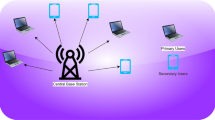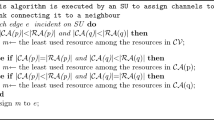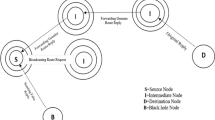Abstract
Due to the lack of centralized administration or fixed network infrastructure, classic routing protocols cannot be applied in mobile ad hoc network (MANET). Hence, some specific ones have been proposed. Paradoxically, due to its importance in the MANET deployment, routing constitutes a privileged target of attackers. In addition, securing MANET constitutes a hard and challenging task that has attracted many researchers. For our concern, we proposed, in a previous work, a reputation-based trust management scheme built upon a recently proposed mobility-based clustering approach (MCA) which classifies nodes into clusters with one-hop members and elected cluster heads (CHs) and which maintains the organization of the network in the presence of mobility. The whole proposition, baptized trust-based MCA (TMCA), detects and isolates malicious behaviors. In order to improve network performance and to maintain its stability by avoiding the re-invocation of the clustering approach, we propose, in the first step of this work, a delegation process based on TMCA, baptized delegation TMCA-based (DTMCA). This delegation allows the CH to transfer its privileges to a chosen member in case of displacement or energy dissipation. In the second step, simulation experiments are conducted to evaluate the performance of the proposed DTMCA scheme. Finally, in the third step, we suggest to model the entire security process with its three components, namely MCA, TMCA, and DTMCA, in a layered manner. This is realized in order to show the different interactions between these three components.


Similar content being viewed by others
References
Dong P, Qian H, Zhou K, Lu W, Lan S (2015) A maximally radio-disjoint geographic multipath routing protocol for MANET. Ann Telecommun 70(5-6):207–220
Kaushik S (2012) Analysis of MANET security, architecture and assessment. International Journal of Electronics and Computer Science Engineering (IJECSE) 1(02):787–793
Manoj V, Raghavendiran N, Aaqib M, Vijayan R (2011) Trust based certificate authority for detection of malicious nodes in MANET. In: Proceedings of the 4th International Conference, ObCom Vellore. TN, India
Ben Chehida A, Abassi R, Guemara El Fatmi S (2013) Towards the definition of a mobility-based clustering environment for MANET. In: Proceedings of the 9th International Conference on Wireless and Mobile Communications ICWMC. Nice, France
Loutfi A, Elkoutbi M, Ben-Othman J, Kobbane A (2014) An energy aware algorithm for OLSR clustering. Ann Telecommun 69(3-4):201–207
Ben Chehida A, Abassi R, Guemara El Fatmi S (2013) A reputation-based clustering mechanism for MANET routing security. In: Proceedings of the 8th International Conference on Availability, Reliability and Security ARES. Germany
Abassi R, Guemara El Fatmi S (2012) A Trust based delegation scheme for ad hoc networks. In: Proceedings of the 7th International Conference on Risks and Security of Internet and Systems CRISIS. Cork, Ireland
Marti S, Giuli T, Lai K, Baker M (2000) Mitigating routing misbehavior in mobile ad hoc networks. In: Proceedings of the 6th annual international conference on Mobile computing and networking (MobiCom), pp. 255-265, Boston Massachusetts, USA
Buchegger S, LeBoudec JY (2002) Performance analysis of the CONFIDANT protocol: Cooperation Of Nodes Fairness In Dynamic Ad-hoc NeTworks. In: Proceedings of the Third ACM International Symposium on Mobile Ad Hoc Networking and Computing (MobiHOC). Lausanne, Switzerland, pp 226–236
Michiardi P, Molva R (2002) Core: A collaborative reputation mechanism to enforce node cooperation in mobile ad hoc networks. In: Proceeding of the IFIP TC6/TC11 Sixth Joint Working Conference on Communications and Multimedia Security: Advanced Communications and Multimedia Security, pp. 107-121, Slovenie
Iqbal M, Wang F, Xu X, Eljack S, Mohammad AH (2011) Reactive routing evaluation using modified 802.11a with realistic vehicular mobility. Ann Telecommun 66(11):643–656
Author information
Authors and Affiliations
Corresponding author
Rights and permissions
About this article
Cite this article
Douss, A.B.C., Abassi, R. & Fatmi, S.G.E. A trust-based security environment in MANET: definition and performance evaluation. Ann. Telecommun. 72, 491–498 (2017). https://doi.org/10.1007/s12243-016-0545-4
Received:
Accepted:
Published:
Issue Date:
DOI: https://doi.org/10.1007/s12243-016-0545-4




